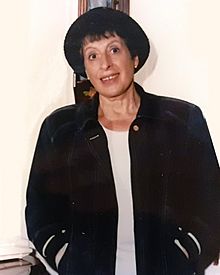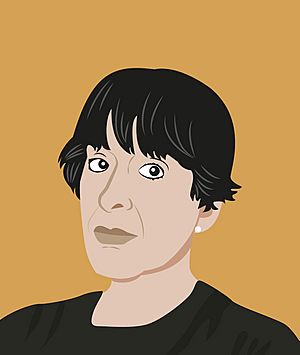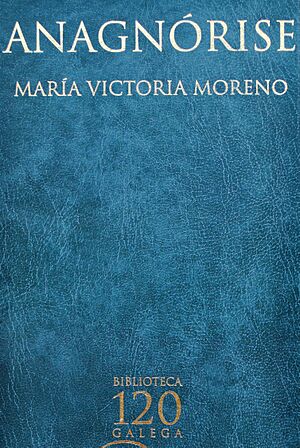María Victoria Moreno facts for kids
Quick facts for kids
María Victoria Moreno
|
|
|---|---|
 |
|
| Born | María Victoria Moreno Márquez 1 May 1939 Valencia de Alcántara, Extremadura, Spain |
| Died | 22 November 2005 (aged 66) Pontevedra, Galicia, Spain |
| Occupation | teacher and writer |
| Language | Galician, Spanish |
| Nationality | Spanish |
| Alma mater | Universidad de Madrid |
| Signature | |
María Victoria Moreno Márquez (born May 1, 1939 – died November 22, 2005) was a Spanish writer and teacher. She was very important in creating books for children and young people in the Galician language. Because of her work, the Day of Galician Literature was celebrated in her honor on May 17, 2018.
Contents
About María Victoria Moreno
María Victoria Moreno was born on May 1, 1939, in Valencia de Alcántara, Spain. Her father was a lawyer and her mother was a teacher.
She studied at the University of Madrid and became a teacher. In 1963, she moved to Pontevedra, where she taught at high schools like IES Valle-Inclán.
María Victoria loved Galicia and its language, Galician. She worked hard to protect and promote the Galician language and culture.
Her Books and Writings
María Victoria Moreno wrote many books, especially for children and young people. She also wrote essays and translated books into Galician.
Books in Galician
Children's Books
- Mar adiante (1973)
- A festa no faiado (1983) - This means "The party in the attic."
- A brétema (1985) - This means "The fog."
- Leonardo e os fontaneiros (1986) - This book won an award!
- Anagnórise (1988)
- O cataventos (1989) - This means "The weather vane."
- ¿Un cachiño de bica? (1994) - This means "A little piece of bica?" (Bica is a type of cake).
- Guedellas de seda e liño (1999) - This means "Tangles of silk and linen."
- Eu conto, ti cantas (2005) - This means "I tell, you sing."
Essays
- As linguas de España (1991) - This essay is about the languages spoken in Spain.
- Diario da luz e a sombra (2004) - This means "Diary of light and shadow."
Stories
- Querida avoa (1992) - This means "Dear grandmother."
Poems
- Elexías de luz (2006) - This means "Elegies of light."
Translations
María Victoria also translated books from other languages into Galician.
- Mecanoscrito da segunda orixe (1989) - She translated this book by Manuel de Pedrolo.
Stories in Collections
She also wrote stories that appeared in collections with other authors.
- "O cataventos" in Contos pra nenos (1979) - "Stories for children."
- "Nico e Miños" in 8 contos (1989) - "8 stories."
- "Querida avoa" in Lerias (1991)
- "Pan con chocolate" in Relatos para un tempo novo (1993) - "Stories for a new time."
- "¡Xa non-teño medo!" in A maxia das palabras (1998–1999) - "The magic of words."
- "Amigos de mil cores" in Campaña de Lectura 2001 (2001) - "Reading Campaign 2001."
Books in Spanish
María Victoria Moreno also wrote and edited some works in Spanish.
Edited Books
- Os novísimos da poesía galega / Los novísimos de la poesía gallega (1973) - This was a bilingual edition of new Galician poetry.
Novels
- Alcores de Donalvar (1969) - This novel was later translated into Galician as Onde o aire non era brisa.
Translations
- El perro Rin y el lobo Crispín (1986) - She translated this book by Carlos Casares.
See also
 In Spanish: María Victoria Moreno para niños
In Spanish: María Victoria Moreno para niños



